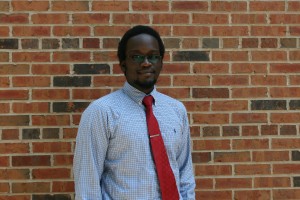 Benjamin Kwasa grew up in Nairobi, Kenya, where he studied aviation technology at Maseno School, one of the three high schools in the country to offer the subject. When it was time for him to decide whether to go to college, his parents challenged him to maximize on the foundation his high school education had provided. As it turned out, Aerospace Engineering at Iowa State University was the beginning of that journey.
Benjamin Kwasa grew up in Nairobi, Kenya, where he studied aviation technology at Maseno School, one of the three high schools in the country to offer the subject. When it was time for him to decide whether to go to college, his parents challenged him to maximize on the foundation his high school education had provided. As it turned out, Aerospace Engineering at Iowa State University was the beginning of that journey.
Once a Cyclone, Kwasa joined the ISU Men’s Rugby Club, which he says made him feel right at home. His time with the rugby club cultivated a culture of hard work and perseverance that carried over to his academics.
As Kwasa finished his undergrad at Iowa State, he began looking for graduate programs around the country and was encouraged to look into the research being done here by Christina Bloebaum, Dennis and Rebecca Muilenburg Professor of Aerospace Engineering and director of graduate education.
Kwasa met with Bloebaum several times during his last semester, discussing his interests and her work. He realized it was exactly what he wanted to do, and when he was accepted to do his Ph.D. at Iowa State, he chose to stay. He has now been at the university for six years.
The research he does involves integrating organization design with value-driven design for systems design. “I am trying to incorporate organizational structure design in how we make large-scale, complex engineered systems,” said Kwasa.
Engineers know the physical aspect of designing a project and the science behind how it works, but Kwasa’s research is something engineers haven’t explored as much. They’re looking at the best ways to set up teams, organizations and individuals that will work on the same large project.
“If we actually understand all the details and intricacies that go into designing these systems, we should then be able to understand or figure out the best way to arrange these teams and people working on different things,” he explained.
It’s all about productivity: save time, money and manpower to make an elegant design, which Kwasa said is meant to do four things. An elegant design is meant to do what it’s supposed to do, be efficient at what it’s supposed to do, minimize the number of unintended consequences and finally, be relatively insensitive to unwanted changes in its operational environment.
And Kwasa’s work in systems design is a big step toward that.
He said the approach they are using involves merging disciplines such as multidisciplinary design optimization, value-driven design and organization design. At a basic level, the work is a step in the evolution of systems engineering.
Bringing in a systems perspective to projects is something Kwasa sees himself continuing in the future.
What Kwasa really wants to do after graduation is be helpful and productive—grant others the same, if not better, opportunities as he has been furnished. He said he doesn’t have it all planned out right now; Kwasa is open to doing almost anything—and with a degree from Iowa State University, he can.